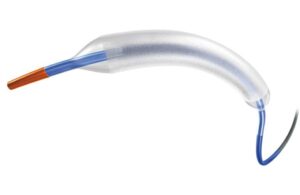
The Marlborough, Massachusetts-based company presented its results at the Transcatheter Cardiovascular Therapeutics (TCT) meeting. Data demonstrated statistical superiority for Agent compared to uncoated balloon angioplasty.
AGENT IDE evaluated the safety and effectiveness of using a DCB to treat coronary in-stent restenosis (ISR). The paclitaxel-coated balloon catheter offers an alternative to treatments like stent layering or radiation. It’s designed to re-open vessels and transfer the therapeutic drug to the vessel wall, helping to prevent ISR reoccurrence.
The Agent DCB has FDA breakthrough device designation.
Boston Scientific set a primary endpoint of target lesion failure at 12 months. Agent DCB topped balloon angioplasty with 17.9% target lesion failure compared to 28.7%.
Other key findings include zero definite/probable cases of clotting within the stent (stent thrombosis). That compared to 3.9% stent thrombosis with uncoated balloon angioplasty. Additionally, Boston Scientific reported a 51% risk reduction in toll-like receptors (TLR, 12.4% vs. 24%). The study saw a 49% risk reduction in target vessel-myocardial infarction (TV-MI, 6.4% vs. 12.3%).
“On behalf of our diverse steering committee, study investigators/coordinators, and especially on behalf of all the patients who participated in this trial, it is so gratifying to see these results which will hopefully facilitate the first approval of a dedicated coronary drug-coated balloon in the United States – fulfilling a huge unmet need for patients,” said trial chair Dr. Ajay Kirtane, director of the Columbia Interventional Cardiovascular Care program and professor of medicine at the Columbia University Irving Medical Center.
